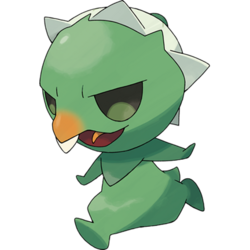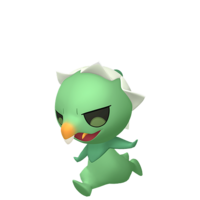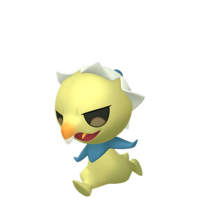From Bulbapedia, the community-driven Pokémon encyclopedia.
Capsakid (Japanese: カプサイジ Capsaiji) is a Grass-type Pokémon introduced in Generation IX.
It evolves into Scovillain when exposed to a Fire Stone.
Biology
Capsakid is a short, green, bipedal plant Pokémon with no arms and a very short, stubby tail. It has a four-leaved dark green collar on its neck. Its head has a white, round cap radially split into six at the rim. This cap resembles an egg shell or the calyx found on fruits, and has a small, bulbous green top. Its face has black eyes and an orange coloration on the tip of its beak-like mouth, which also contains a single front tooth on the upper jaw. Capsakid's front tooth falls out naturally, and is used as a spice in traditional Paldean cooking. Capsakid creates spicy chemicals inside its body by using energy from sunlight, which it uses to power its moves.
In the anime
Major appearances
Minor appearances
In the manga
In the TCG
- Main article: Capsakid (TCG)
Game data
Pokédex entries
| This Pokémon was unavailable prior to Generation IX.
|
| Generation IX
|
|
|
Paldea
#250
|
| Scarlet
|
The more sunlight this Pokémon bathes in, the more spicy chemicals are produced by its body, and thus the spicier its moves become.
|
| Violet
|
Traditional Paldean dishes can be extremely spicy because they include the shed front teeth of Capsakid among their ingredients.
|
|
|
Game locations
| This Pokémon was unavailable prior to Generation IX.
|
|
|
In side games
Held items
Stats
Base stats
| Stat
|
Range
|
| At Lv. 50
|
At Lv. 100
|
50
|
|
110 - 157
|
210 - 304
|
62
|
|
60 - 125
|
116 - 245
|
40
|
|
40 - 101
|
76 - 196
|
62
|
|
60 - 125
|
116 - 245
|
40
|
|
40 - 101
|
76 - 196
|
50
|
|
49 - 112
|
94 - 218
|
Total: 304
|
Other Pokémon with this total
|
- Minimum stats are calculated with 0 EVs, IVs of 0, and (if applicable) a hindering nature.
- Maximum stats are calculated with 252 EVs, IVs of 31, and (if applicable) a helpful nature.
|
Type effectiveness
| Under normal battle conditions in Generation IX, this Pokémon is:
|
|
|
|
|
|
|
|
|
|
|
|
|
Learnset
|
|
|
|
- Bold indicates a move that gets STAB when used by Capsakid
- Italic indicates a move that gets STAB only when used by an Evolution of Capsakid
|
|
|
|
|
- Bold indicates a move that gets STAB when used by Capsakid
- Italic indicates a move that gets STAB only when used by an Evolution or an alternate form of Capsakid
|
|
|
|
|
- Moves marked with an asterisk (*) must be chain bred onto Capsakid
- Bold indicates a move that gets STAB when used by Capsakid
- Italic indicates a move that gets STAB only when used by an Evolution of Capsakid
|
Side game data
Pokémon GO
| File:GO0951.png
|
Base HP: 137
|
Base Attack: 118
|
Base Defense: 76
|
| Egg Distance: N/A
|
Buddy Distance: ? km
|
Evolution Requirement:  50 50
|
| Fast Attacks:
|
| Charged Attacks:
|
|
|
Evolution
Sprites
| This Pokémon was unavailable prior to Generation IX.
|
|
|
|
|
Trivia
Origin
Capsakid's category and appearance suggest it may be based on an immature chili pepper such as the habanero (as alluded to in its Japanese category). Its cap and beak also make it resemble the kappa. It also resembles a newly hatched baby dinosaur, with its white cap resembling a piece of egg shell.
Name origin
Capsakid may be a combination of capsaicin (active component of chili peppers), kappa, and kid.
Capsaiji may be a combination of capsaicin, kappa, and 児 ji (child).
In other languages
| Language
|
Title
|
Meaning
|
 Japanese Japanese
|
カプサイジ Capsaiji
|
From capsaicin and 児 ji
|
 French French
|
Pimito
|
From piment and chiquito
|
 Spanish Spanish
|
Capsakid
|
Same as English name
|
 German German
|
Chilingel
|
From Chili and Schlingel
|
 Italian Italian
|
Capsakid
|
Same as English name
|
 Korean Korean
|
캡싸이 Kaepssai
|
From capsaicin and 아이 ai
|
 Mandarin Chinese Mandarin Chinese
|
熱辣娃 / 热辣娃 Rèlàwá
|
From 熱 / 热 rè, 辣 là, and 娃 wá
|
 Cantonese Chinese Cantonese Chinese
|
熱辣娃 Yihtlaahtwā
|
From 熱 yiht, 辣椒 laaht, and 娃 wā
|
|
|
|
| More languages
|
 Thai Thai
|
แคปไซจิ Khaepsaichi
|
Transcription of Japanese name
|
|
|
|
Related articles
External links

|
This Pokémon article is part of Project Pokédex, a Bulbapedia project that aims to write comprehensive articles on each Pokémon species, as well as Pokémon groups and forms.
|
 For other sprites and images, please see Capsakid images on the Bulbagarden Archives.
For other sprites and images, please see Capsakid images on the Bulbagarden Archives.






























